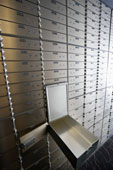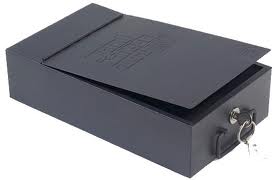Safeguard Your Very Important Papers: Safe Deposit Box Basics
Paper Doll worries about your VIPs — your Very Important Papers. Usually, we talk about what those VIP documents are, how to locate them, and where to keep them (generally speaking, in terms of filing hierarchies). But what about the safest places for your VIPs? Today, we’ll be talking about safe deposit boxes.

YOU MIGHT NEED or WANT A SAFE DEPOSIT BOX…IF:
–You want to keep track of where your vital documents are located and want them all in one central and safe location.
–You want a completely private location in which to store and review your documents or possessions. (Image how different Mad Men‘s Don Draper’s life would have been if that top desk drawer hadn’t been tempting Betty with its secrets!)
–You want your loved ones to have easy access to important documents even if you are unavailable (traveling, ill, etc.)
–You want to protect your important documents (and possibly other possessions, such as fine jewelry, coin collections, medals, photographs, and written or photo/videographic home inventories for insurance purposes) from theft, fire, flood or natural disaster.
–You recognize that most home safes portable enough for you to take with you during a disaster would also be portable enough for thieves to carry away into the night and that the combinations aren’t generally very hard for thieves to crack.
–You have family heirlooms and precious documents that are too delicate to be left in the open in a home where children, pets and others could cause damage.
–Your insurance company may discount your homeowner’s insurance if you notify them of the use of a safe deposit box for valuable assets. Most (but not all) insurance policies will cover the value of possessions stored in a safe deposit box. Call your agent to ensure you have all the protection you need — and are given all the discounts you deserve.
YOU MIGHT NOT NEED or WANT A SAFE DEPOSIT BOX…IF:
–You’re comfortable scanning your documents (to a hard drive or flash drives stored off the premises or to a storage site in the cloud, like Dropbox) and aren’t that worried about maintaining the originals. Some people don’t worry that much about fire, flood or theft and have so few vital documents that they are willing chance the cost of replacement fees.
–You relocate often due to your family, work, academic or volunteer obligations.
–You can’t afford safe deposit box rental prices.
–You hate banks and credit unions, prefer to live off the grid and don’t want “The Man” to know where you are or what documents you possess.
If any of these apply to you, a portable fireproof, waterproof safe might satisfy your needs. However, as noted above, such safes can be easily purloined and cracked.
HOW TO RESEARCH A LOCATION AND BOX
Take some time to do your research to determine the best safe deposit box solution for your needs.
1) Select a bank branch convenient to your home or work — Many full-time workers can get away to the bank on their lunch hours, but might not be able to access the bank as conveniently from home. However, if your spouse will be more likely to access the box than you, having it close to his/her office, or closer to home, might make more sense. Think about when you’ll want to access the box, either for retrieval or for putting items in.

2) Compare prices — Generally, it makes sense to get a safe deposit box at your own bank, as customers get discounted pricing.
Also, consider how big a box you need, as rental rates vary by size (from $15 to a few hundred dollars per year). While the depth of safe deposit boxes are standard (generally about 18-22 inches), the height and width dimensions come in multiple categories. The smallest boxes are usually 3″ x 5″, but unless you have very few documents, you’d have to roll your papers to make them fit. Medium boxes range from 3″ x 10″ to 10″ x 10″. The largest safe deposit boxes in consumer banks tend to be about 15″ x 15″, though larger specialty boxes can be arranged at banks that cater to clients who have large financial holdings.
3) Ask about policies and fees. What are the key replacement fees? What are the charges for drilling boxes if keys are lost? Is there comfortable (or any) seating available in the vault, in case you need time to go through the contents of your box and need to sort documents?
HOW TO RENT A SAFE DEPOSIT BOX
Decide whether you want to share access with someone else: your spouse, parent(s), child(ren), business partner(s) or friend(s). You can’t just designate someone as a co-owner and give them a key. They’ll have to sign the signature card and show photo ID — both at the time of rental and to gain access.
If you don’t intend to share, make the time to designate a Power of Attorney or agent to act on your behalf for financial and other urgent matters if you’re ever unable to access the box yourself. However, designation of a Power of Attorney ceases upon your death. Eventually, the executor of your will can gain access (depending on the probate and estate procedures of your state), but this can be a lengthy process. Some states will allow you to create a temporary executor clause to speed the process, but regulations are not uniform in this regard. You can, however, appoint a trustee to oversee any of your assets you place in a trust; the trustee can then access the box after your death. Complicated? Very. If your possessions and documents are relatively simple, you’re probably better off naming as co-renter someone in which you can place great trust (like Paper Mommy).
Make an appointment. No, it’s not essential, but you might feel better about setting an appointment to sit down with a bank representative to deal with the paperwork. Also, not all bank branches have available boxes. By calling ahead, you can determine whether you wish to be placed on a waiting list or will need to select an alternative branch. Be prepared to fill out some forms, sign a lease agreement and pay for the initial rental term. Make sure co-renters are available to come to the appointment as well.
Bring your photo ID. Co-renters should do the same.
Bring the items you wish to store. Before you leave the house or office, create an inventory list, and bring a copy of the list with you. As you place the items or documents in the box, check them off your list.
Bring your camera and take a photo of the items in the box. The date-stamped photo and list will help you keep track of what’s inside. (Take a photo and/or adjust your list when you add or remove documents or possessions.)
Bring a few zip-lock plastic bags for protecting items in case of floods or sprinkler system malfunctions. Most file folders will fit in gallon-sized bags. If you’re safeguarding delicate non-flat items (and your box is large enough) Tupperware or Rubbermaid food containers also afford protection from water damage. Put a label with your name and contact information inside the container so that items can be identified as yours in the aftermath of any disaster.

Keep your key somewhere safe and memorable. If allowable, make a copy of your key (or purchase a second, if one is not made available for free). Even if someone has your key, he or she should not be able to access your safe deposit box, as proof of identification and signature is required in tandem with a key. Key loss, however, may require drilling of the box — at prices exceeding $150.
OTHER CONSIDERATIONS
If you are a singleton and haven’t made arrangements for another person to have signature access, designate a Power of Attorney for financial issues. This way, if you are stranded abroad, disabled, or comatose, your loved ones will be able to help oversee necessary activities on your behalf.
Possessions can still be damaged or stolen. Faulty sprinkler systems, actual fires, floods and yes, even bank robberies, can lead to loss or damage of your items. This is why it’s necessary to maintain an inventory at home of the contents of your safe deposit box, just as you might keep an inventory of your possessions at home in the box.
The contents of your box will not be available 24/7/365. There’s a reason they’re called bankers’ hours — generally 8a – 5p, Monday through Friday, with some wiggle room on Saturday mornings and occasional late Friday hours. But banks are closed on federal (and some state) holidays, Sundays, and more than 12 hours of every day, from dinnertime to breakfast.
Access to your safe deposit box can be frozen. For example, if you are involved in a dispute with the Internal Revenue Service, the IRS can block your access. Also, if law enforcement officials (including the Department of Homeland Security) believe you and/or the contents of the box are related to illegal activity (drugs, guns, explosives, or illegally-obtained items), a court order can be issued to give law enforcement access to the contents of your box.
Your safe deposit box can be declared “abandoned” — if you stop paying your rental fee, maintain no communication with the bank, and nobody in your family or overseeing your estate is aware that you possessed the safe deposit box, the contents of the box will eventually be turned over to your state’s Unclaimed Property division. Make sure your loved ones or legal representatives know you have a box, where it is, and the location of the key.
WHAT YOU SHOULDN’T KEEP IN YOUR SAFE DEPOSIT BOX

Large amounts of cash — First, you’re not earning any interest. Second, cash is less accessible in your safe deposit box than in your bank account, from which you can at least make withdrawals or debit purchases. Third, cash (and any other assets) kept in your safe deposit box (as opposed to an actual account) won’t be protected by the Federal Deposit Insurance Corp., nor covered under FDIC rules. (Cash in your bank account is insured up to $250,000 per depositor per bank; cash in your box isn’t insured at all.) Currency is less likely to catch on fire or be accidentally thrown away than if you stored it in your mattress, but it is otherwise one of the worst things you can keep in the box.
Your will — If the only legal copy of your will is in your safe deposit box, unless you have a co-renter, your family will have to secure a court order to access the will…and the rest of the box…speedily. Whenever possible, your attorney should keep an original of your will; just keep copies in the box.
Anything you will need in an emergency — Obviously, this will vary widely by user. For most people, any international travel comes after months of planning and preparation. However, if you work for a multi-national corporation that flies you around the world at a moment’s notice, or if you’re an international spy, you probably aren’t going to want to wait until the Tuesday morning after a federal holiday to run into the bank to get your passport. (Or, y’know, passports (plural), if you’re a spy.)
Original, sole copies of vital documents that your family might need if you become incapacitated — If you are the only person to have access to your safe deposit box and you have not designated someone as having Power of Attorney (or have stored the only existing copy of the Power of Attorney paperwork in the box), lack of access to an original of your living will/medical directives and other life or end-of-life instructions could create major problems. In general, if the original or any document (other than your will) is going in the box, keep sharp copies at home (or in the cloud).
There are a variety of sources online to help prompt you regarding what documents you might want to keep in your safe deposit box, including my ebook, Do I Have To Keep This Piece of Paper?, which identifies what documents need to be kept, how long to keep them and the best locations for doing so.
Not everyone needs a safe deposit box, but not knowing the facts isn’t a good enough reason to leave your papers unprotected. Be safe.




Follow Me